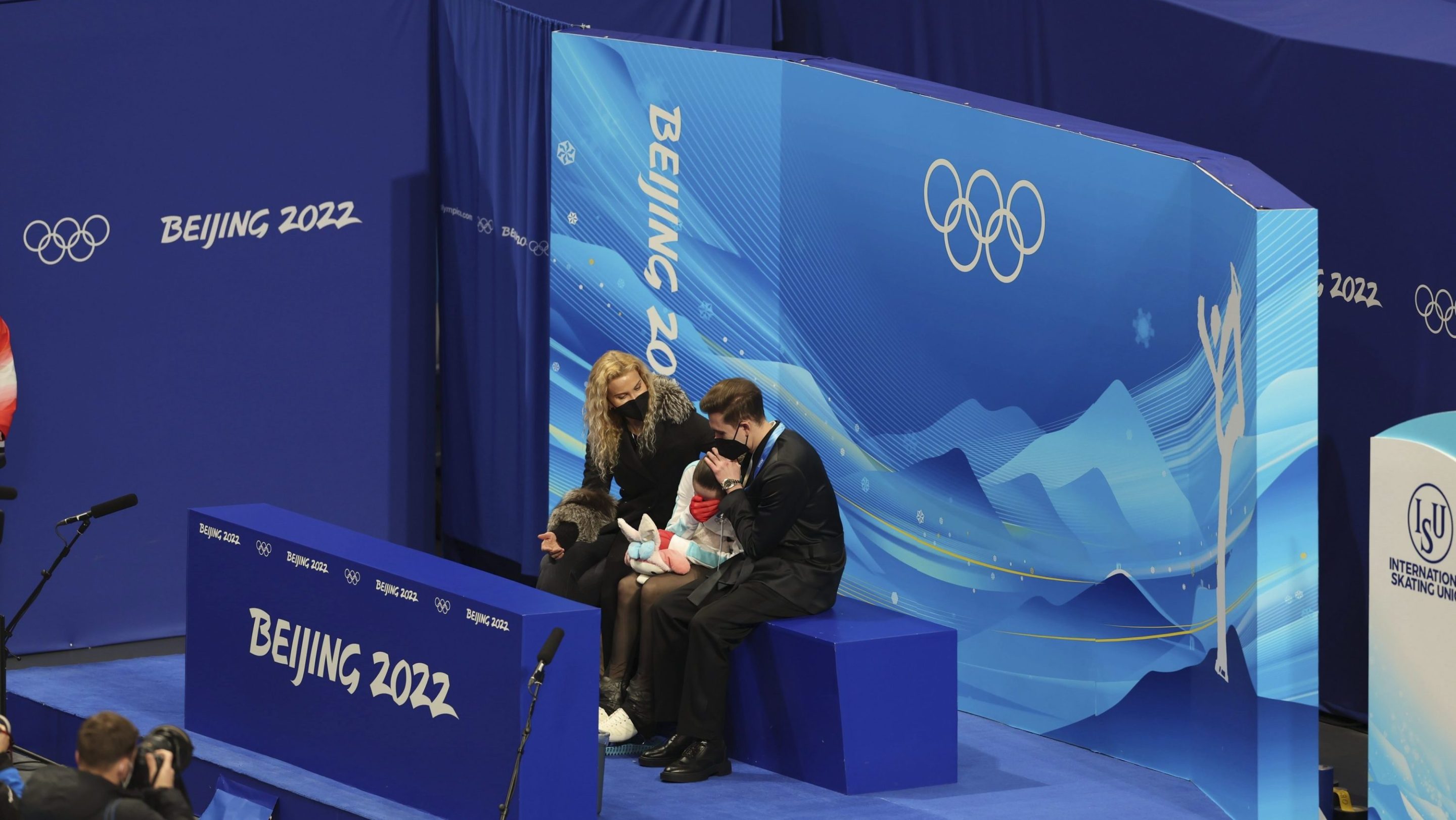Remember 2022? I know, it's been a minute. But close your eyes for a moment, and you might recall the bizarre series of meltdowns that occurred live on TV during the 2022 Winter Olympics women's free skate. Ah, yes, it's all coming back to you now. The sobbing. The scolding. The confusion. The 17-year-old silver medalist reportedly saying, "I hate everyone, I hate this sport." The gold medalist, also 17 years old at the time, all alone, clutching a teddy bear. It was large-scale emotional breakdown, broadcast live around the world.
The cause for the macabre scene was news breaking during the Olympics that the expected women's gold medalist—Russia's Kamila Valieva, then 15—had tested positive for trimetazidine, a banned heart medication. That Olympics was supposed to be Russia's crowning glory in women's figure skating, with three women, all coached by the polarizing Eteri Tutberidze and all under the age of 18, expected to skate with quad jumps in their routine. It wasn't outlandish at the time to think Russia would sweep the women's podium. Valieva's positive test upended all that.
The news of the positive test came after skaters had competed in the team portion of the Olympics—with Russia appearing to win gold—but before individual competition. The Court of Arbitration for Sports said Valieva could continue to compete in those Olympics, which she did, but she looked a bit shaky in her short program and fell apart in the free skate, ultimately finishing fourth. Afterward, Tutberidze told the clearly upset 15-year-old, per a New York Times translation, "Why did you stop fighting? Explain it to me, why? You let it go after that axel. Why?"
Because Valieva did not medal that day, the gold, silver, and bronze medals were awarded without questions. But the team medals, due to Russia's placement, which included points earned in skates by Valieva, were put in a sort of limbo, with those medals ungranted for nearly two years. On Monday, some clarity came when the CAS ruled that Valieva had violated doping rules. The official CAS announcement said that Valieva would be ineligible for four years, with the ban starting retroactively on Dec. 25, 2021 (the date of the positive test), and "all competitive results of Ms. Valieva from 25 December 2021 are disqualified."
The natural follow-up question to that was: What would that mean for the 2022 team medals? The answer on that would have to come from the International Skating Union, which oversees international ice skating. It responded a day later, on Tuesday, by saying that Valieva would be disqualified from all the competitions in which she participated during the time period covered by the ban. In regards to the Beijing games, the ISU said "all her individual results and points in the Short Program and the Free Skating competitions will be dismissed leading to a re-ranking of the Team."
In other words, the ISU was scratching Valieva's points, as if she had never skated. But they also did not re-allocate the points that Valieva had been awarded in the team skates. In this new ranking, the United State takes gold, Japan takes silver, and Russia gets bronze. However, if Valieva's points had been re-allocated, giving them to the people who would have finished higher if not for her participation, Canada would have finished third and received the bronze. As longtime Olympics journalist Philip Hersh put it, "This would be a Solomonic decision if old Sol had flunked third grade math."
The decision seemed to bring together otherwise enemies against the decision. Skate Canada said in a statement that it would "consider all options to appeal this decision." The Russian Olympic Committee, in a statement shared by Hersh, went a step further and said it "will definitely appeal." Anyone looking for clarification from the ISU wasn't getting a response. USA Today's Christine Brennan wrote that she sent four emails to ISU spokespeople—they all went unanswered.
At least Team USA's gold medal appeared unquestionable. Five members of that team all appeared on Today, nearly two years later, for an extremely belated celebration.
Two days and several press releases later, though, its hard to ignore that one of root causes of what unfolded appears largely unaddressed: Valieva's coach, Tutberidze, known for teaching teenage girls how to spin very fast in the air with ice skates on their feet—just don't think too hard about how the competitive careers of all the female athletes who train with her end well before the age of 18. Following the CAS and ISU decisions, I re-read a piece from Rita Wenxin Wang in Slate about how Tutberidze has cranked out so many winners, and at what price:
Tutberidze has come to be regarded as the world’s leading expert in creating figure skating champions. Her methods are no secret. The Eteri girls talk openly about not being able to drink water during competitions. They do their best to delay puberty by eating only “powdered nutrients” or by taking Lupron, a puberty blocker known to induce menopause. They are subjected to daily public weigh-ins and verbal and physical abuse. And they compete while injured, huffing “smelling salts” while wearing knee braces and collapsing in pain after programs.
Every year, a new, younger Eteri girl emerges on the scene while others retire, at age 17, 16, or even 14. Skating fans call this the “Eteri Expiration Date.”
Russian skaters are banned from international skating competitions due to Russia's ongoing invasion of Ukraine, however Valieva has continued to skate in the Russian national circuit as well as for TV events, as Eddie Pells wrote for the Associated Press. Valieva hasn't been finishing first, though. She's being beaten by younger skaters. Tutberidze is their coach.






